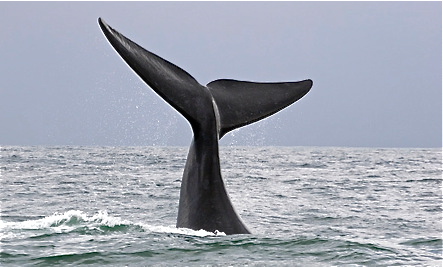For decades now, scientists at the National Oceanic and Atmospheric Administration (NOAA) have been tracking a mysterious whale song that sounds like the ghostly howls of a drowned tuba player. The sounds have been identified as belonging to a single whale, who sings at a frequency unlike any other whale in the world.
Dubbed “52 Hertz” after the frequency range in which he typically sings, the animal has been called the loneliest whale in the world, since his love songs seem destined to go unanswered. Most other species of baleen whale, such as blue whales and humpbacks, sing at frequencies much higher, between the 15-25 Hertz range.
Not only does 52 Hertz sing at a much lower frequency, but his calls are also shorter and more frequent than those of other whales. It’s as if he speaks his own language– a language of one. Even stranger, 52 Hertz does not follow the known migration route of any extant baleen whale species. He sings alone and travels alone.
Could this individual be the last of a previously unknown species of baleen whale? That’s one possibility. Whale biologists have also proposed that he could be malformed, or maybe a rare hybrid– perhaps a blue whale and fin whale cross. Whatever the explanation, 52 Hertz is one of a kind.
There’s also some evidence that he is maturing, since his voice has deepened slightly since the Navy first identified him in 1992, according to a 2004 article at the New York Times.
Although 52 Hertz’s exact age is unknown, he continues to survive 20 years after his initial discovery. He was last recorded not far off the Aleutians and Kodiak Island, according to Alaska Dispatch– which is also the closest he has come to land since first being tracked. You can view a zigzagging map of his migration routes between 1992 and 2004 here.
You can also hear recordings of 52 Hertz’s calls at the NOAA here, and you can even compare how he sounds to other baleen whales.
While whale lovers may lament the mournful tale of the loneliest whale in the world, there is some reason for hope, too. 52 Hertz seems to be healthy, in spite of his loneliness.
“The fact that this individual has been capable of existing in that harsh environment [for so many years] indicates there is nothing wrong with it,” said Dr. Kate Stafford, a researcher at the National Marine Mammal Laboratory in Seattle, to the New York Times.
Selected from the Animal Planet




